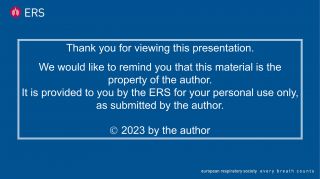20 November, 2023 | Online
18:00-19:00 CET
Chairs: Dr. Carolina Arez Constant (Lisboa, Portugal), Dr. Ahmad Kantar (Bergamo, Italy)
Speakers: Ms. Zena Powell (Aylesbury, United Kingdom), Prof. Andrew Bush (London, United Kingdom), Prof. James D. Chalmers (Dundee, United Kingdom)
Fees: Free for ERS members / €10 for non-members
Find out more about becoming a member
Overview
Non-CF Bronchiectasis is a clinical syndrome of recurrent or persistent wet/productive cough, lower airway infection and/or inflammation, and abnormal bronchial dilatation on chest computed tomography scans. It is a heterogenous chronic pulmonary disorder with many risk factors and aetiologies.
Previously considered irreversible, current data shows that paediatric non-CF bronchiectasis might be reversible over time. Achieving this goal requires early disease recognition leading to appropriate investigations to both diagnose and manage bronchiectasis. Evaluation for treatable underlying causes and effective management are therefore important.
Children/adolescents also require developmentally appropriate care, support and supervision from their parents. Those with untreated non-CF bronchiectasis symptoms from childhood have worse disease and a poorer prognosis. Non-CF Bronchiectasis is still one of the most neglected lung disorders, with high individual disease burden, economic cost and poor quality of life for children/adolescents and their parents. Also, there are large disparities in the standards of care and outcomes between bronchiectasis and other chronic lung diseases.
This webinar will provide an update on current literature on non-CF bronchiectasis and the needs for early disease recognition, prevention and transition from paediatric to adult care.
Moreover, the webinar will offer an opportunity to examine patients experiences, attitudes, preferences, needs, and expectations in patients non-CF bronchiectasis. Patients' perspectives and health goals are at the heart of the care process.
These arguments are among the objectives of the ERS-CRC - Child-BEAR-net (Children's Bronchiectasis Education Advocacy and Research Network).
Educational aims
- To analysis patient experiences, needs and perspectives and the method of patient involvement at different phases of disease management
- To highlight the risks of delayed diagnosis of the underlying causes of non-CF bronchiectasis
- To give indications how to improve care for children with non-CF bronchiectasis
- To discuss the transition from paediatric to adult care
Topics
- Living with bronchiectasis: a patient perspective - Zena Powell
- Undiagnosed bronchiectasis in children - Andrew Bush
- Outgrowing pediatric care in bronchiectasis - Stefano Aliberti
Target audience:
- Paediatric pulmonologists
- Adult pulmonologists
- Paediatricians
- Infectious disease specialists
Format
The webinar will include a patient testimonial, lectures, interactive discussions with participants and two case presentations.
Learning outcomes
After following this webinar, participants should be able to:
- Appreciate patients experiences, needs and expectations
- Recognise diagnostic errors and delay in diagnosis
- Apprehend how to care for children with non-CF bronchiectasis
- Launch developmentally appropriate care and transition from paediatric to adult care
CME credit
An application for accreditation of this webinar has been made to the European Board for Accreditation in Pneumology (EBAP) for 1 CME credit per 1-hour attendance. If accredited, the CME credit will be granted upon attendance of at least 60 minutes during the live webinar only.
What is a webinar?
A webinar closely simulates a lecture-based teaching experience. The speaker can interact with the audience, just as in a classroom setting. During the webinar, you will be asked to share your opinion on issues related to the topic using interactive polls.
All participants will be able to hear the lecturer and see the slides throughout the presentation. As a participant you will be able to pose questions or discuss ideas with the other participants via the text chat facility and the speaker will respond to the questions via the microphone.
Login guidelines
More information will be communicated in due course.
- Please log in to the webinar 20 minutes before it is scheduled to commence. If you have any technical difficulties whilst trying to log in or during the session please contact e-learning@ersnet.org.
- Check Central European Time.
- To achieve the best quality, we recommend to avoid downloading anything from the internet during your connection to the lecture and stopping all other programmes.
- Please also ensure that your audio settings are not set to mute and adjust the volume to a comfortable level.

